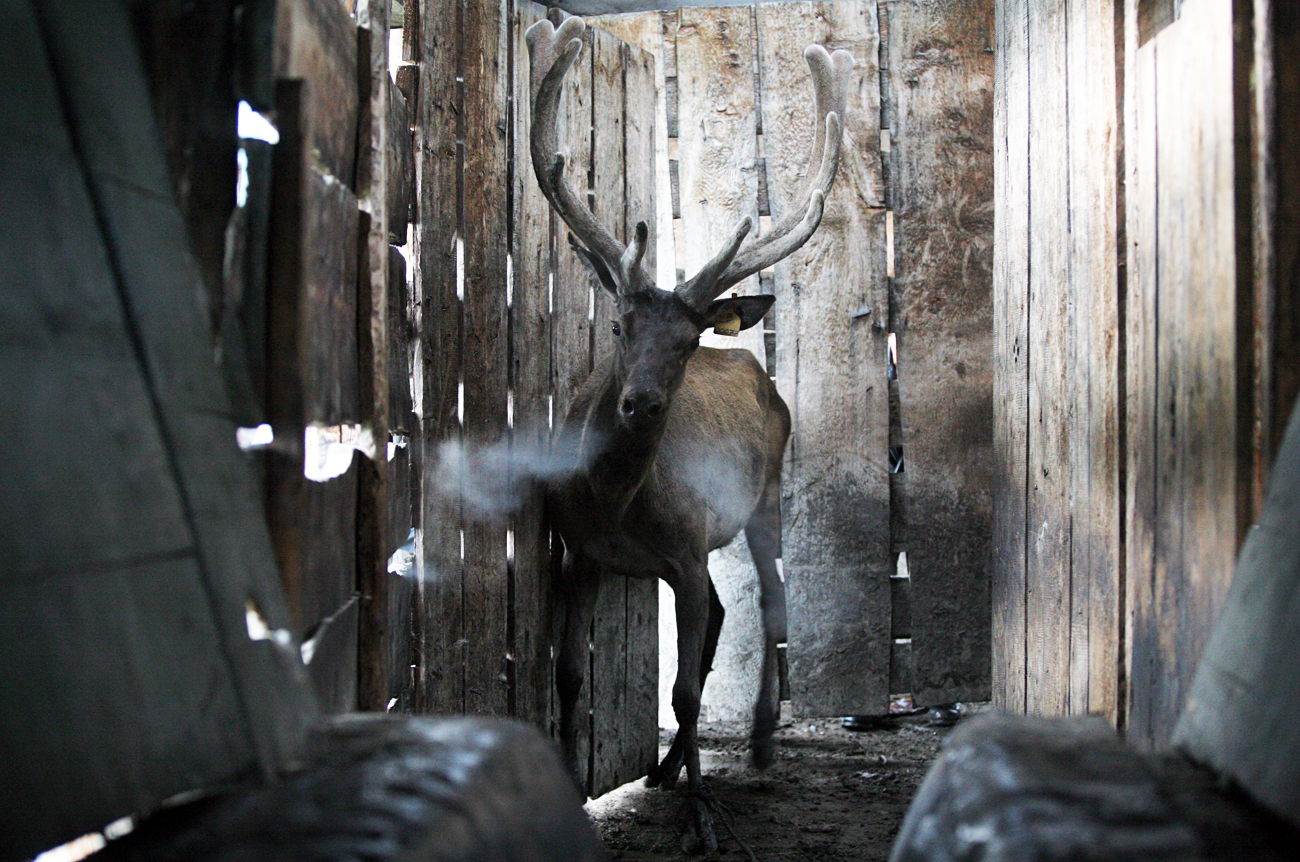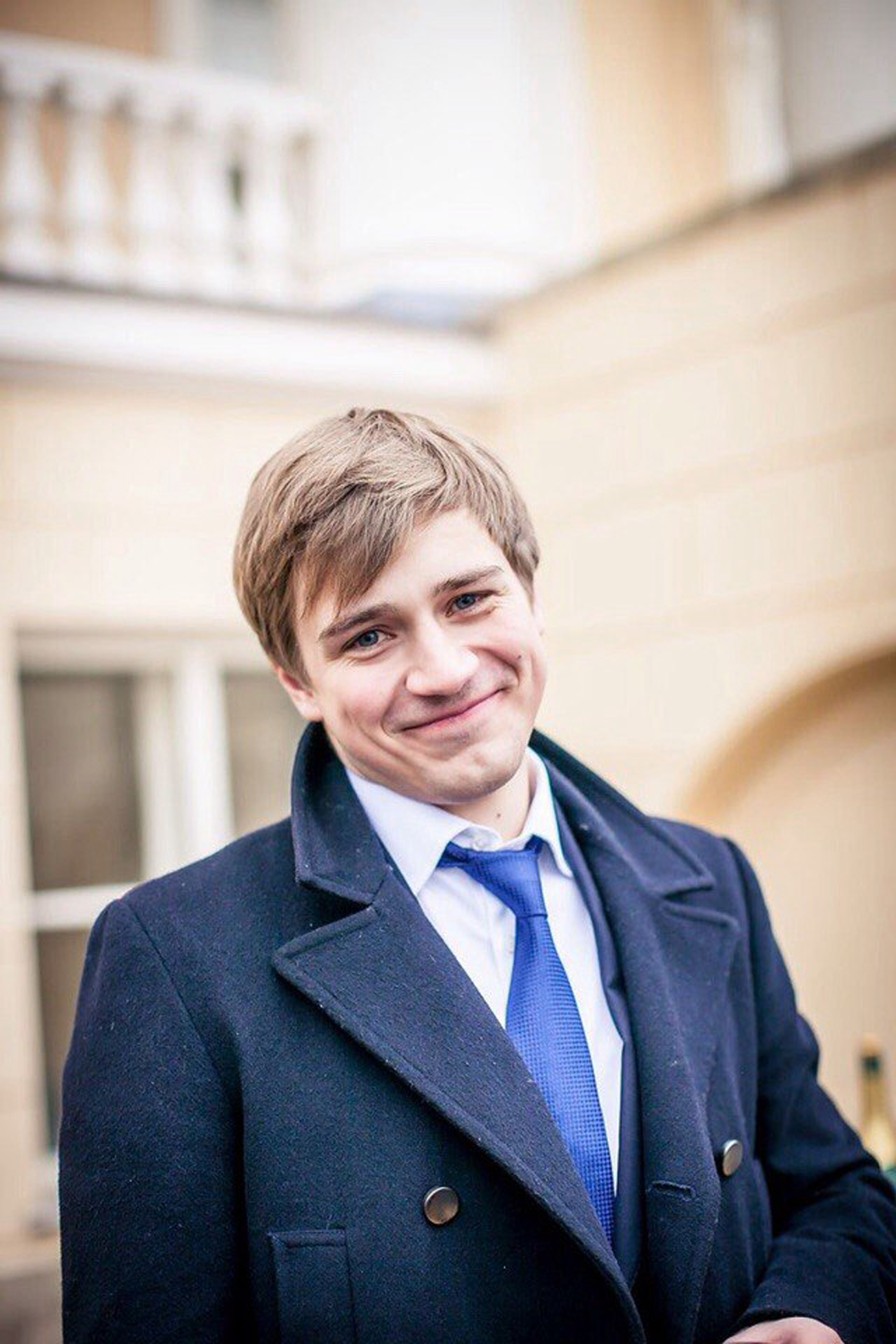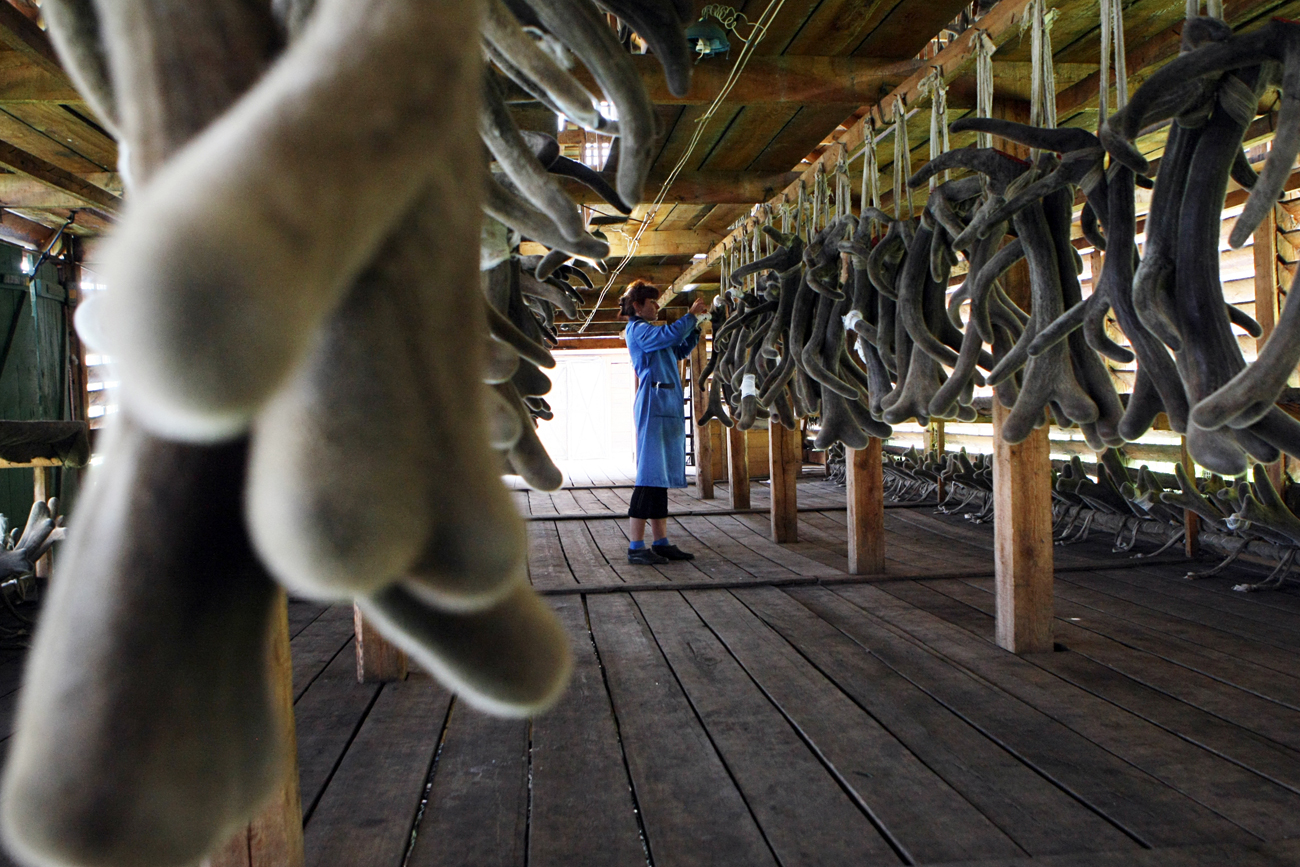
In 2013, the younger and elder Kuvikin spent 30 million rubles ($475,000) on 300 red reindeer and 1,500 hectares of land with several buildings. Photo: An "Abaisky" farm, valley of the Yeland river, Ust-Koksinsky district, Republic of Altai.
Alexandr Kryazhev/RIA NovostiKuvikin didn’t set out to become a reindeer herder, spending his mornings on horseback patrolling his family’s 1,500 hectares of land. After graduating from the Siberian State University of Telecommunications and Informatics, he earned a master’s degree in political science at Moscow State University. With that degree in hand, Kuvikin came up with ideas for a number of politically oriented projects.
First, he promoted the idea of a kind of “youth” version of an APEC summit to be held in Novosibirsk. Although the concept was met with approval, he was unable to secure funding for it. Then, he began to develop a Russia-wide community for young entrepreneurs. Finally, he decided: "I'm a simple guy from Siberia, who got into the Moscow State University, looked around and realized that my result in politics equaled zero.” He decided to concentrate on something more concrete.
While Kuvikin was having this crisis of conscience, his father was considering buying a reindeer farm. There are about 200 farms in the Altai Territory for reindeer breeding that focus on the sale of Altai reindeer horns (antlers) for export. The antlers are used in nutritional supplements. The best-known foreign brands marketing such supplements are Deer Antler and Antler Farms. The blood of the reindeer can be sold in concentrated form to be used in the preparation of the antlers.
 After graduating from the Siberian State University of Telecommunications and Informatics, he earned a master’s degree in political science at Moscow State University. With that degree in hand, Kuvikin came up with ideas for a number of politically oriented projects. Photo: Nikolay Kuvikin. Source: Personal archive
After graduating from the Siberian State University of Telecommunications and Informatics, he earned a master’s degree in political science at Moscow State University. With that degree in hand, Kuvikin came up with ideas for a number of politically oriented projects. Photo: Nikolay Kuvikin. Source: Personal archive
New Zealand controls 40 percent of the market for reindeer products. There are more than 2,000 farms and 1 million deer in that country. The Altai Territory is another important producer. Most customers come from China and South Korea, where reindeer products are used in traditional medicine.
Initially, Kuvikin wasn’t particularly enthusiastic about the reindeer farm idea. "I had doubts at first, but then I realized that my father was the best partner I could ever find," Kuvikin said. In 2013, the younger and elder Kuvikin spent 30 million rubles ($475,000) on 300 red reindeer and 1,500 hectares of land with several buildings. The invested another several million rubles in constructing and upgrading facilities. They spent almost all of their savings.
 The Kuvikins soon found that there are two major problems on reindeer farms: drunken employees and hungry bears. Photo: A Nizhneuimonsky raindeer farm, Ust-Koksinsky district, Republic of Altai. Source: Alexandr Kryazhev/RIA Novosti
The Kuvikins soon found that there are two major problems on reindeer farms: drunken employees and hungry bears. Photo: A Nizhneuimonsky raindeer farm, Ust-Koksinsky district, Republic of Altai. Source: Alexandr Kryazhev/RIA Novosti
The Kuvikins soon found that there are two major problems on reindeer farms: drunken employees and hungry bears. Solving the first problem was fairly easy: They fired all the drunks. The second problem was more of a challenge. The Kuvikins rebuilt all their fences, but bears still manage to get in. Every year, they eat up to 40 deer.
While Kuvikin’s father was fighting with the bears, the son took over marketing. In the winter of 2014, Kuvikin created an online store to increase the base of retail customers and take some business away from the middlemen. Kuvikin decided that his best bet was to increase domestic sales. According to his calculations, the margins on domestic sales were 30 percent higher than sales for export.
The proceeds from the sales of antlers and concentrated blood to wholesalers amounts to about 7 million rubles ($111,000) per year. The products are then bought by manufacturers of dietary supplements, cosmetics and alcohol, spa centers and retailers who then market the goods under their own brands.
The family makes an additional 2 million rubles ($31,700) annually from its online store; an additional 1 million rubles ($15,800) comes from selling excess animals. The price of a single male deer is 75,000 rubles ($1,190) and a female – 65,000 rubles ($1,030). Each year, about 70 young deer are born. This summer, the Kuvikins built small cabins on their property as part of a plan to develop eco-tourism. So far, only friends and family have visited, however.
According to Kuvikin, the company’s total revenues are 10 million rubles ($159,000) with a profit of 3 million rubles ($47,600).
The farm produces almost no waste. The reindeer meat goes to restaurants in Novosibirsk, the antlers are used for powder and the blood is used for the production of pantogematogen and bath concentrate.
After the collapse of the Russian currency in December 2014, Kuvikin noticed that prices in sports nutrition stores went up sharply, and some products disappeared from the shelves completely. He began wondering if reindeer antlers could be used in sports nutritional supplements. After doing some research, Kuvikin discovered that there are seven American nutritional supplement brands that use deer antlers, but no one was engaged in this business in Russia. In early 2015, Kuvikin registered the trademark Irondeer.
Kuvikin decided to promote the brand at sporting events, starting with the Ironstar Sochi triathlon in June 2015. The experience was mixed. "We missed the marketing: all the texts on the packages had been written for bodybuilders, while our offer was aimed at runners," Kuvikin said.
He corrected those mistakes and is now supplying dietary supplements for the Russian national triathlon team. Brothers Igor and Dmitry Polyansky as well as Alexander Bryuhankov took the supplements, which are not considered doping, during the 2016 Summer Olympic Games in Rio de Janeiro.
Irondeer now is sold in 20 stores in Moscow, St. Petersburg, Chelyabinsk, Arkhangelsk and Voronezh. Kuvikin is seeking partners at special trade shows and sporting events and working to reduce costs. A tub of supplements containing 30 capsules of the medication based on deer blood costs 800 rubles ($12.70) in retail; the wholesale price is 400 rubles ($6.30).
According to preliminary projections, in 2016, Irondeer sales are expected to amount to 1.5 million rubles ($23,800). This is much less than sales of traditional antler products, but the profit margin for the supplements is 50 percent higher than for semi-finished traditional products.
All rights reserved by Rossiyskaya Gazeta.
Subscribe
to our newsletter!
Get the week's best stories straight to your inbox